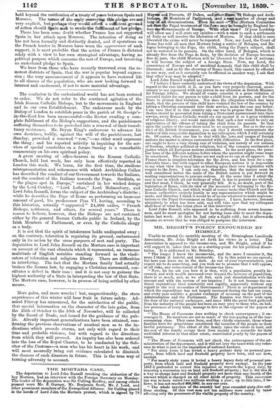The confusion in the ecclesiastical world has not been restored
to order. We do not refer to the continued agitation of the Irish Roman Catholic Bishops, but to the movements in England and in our own Establishment. The endeavour made by the Bishop of London to establish peace in the parish of St. George's- in-the-East has been unsuccessful—the Rector evading a com- plete fulfilment of the Bishop's suggestions, and the parishioners suffering themselves to be provoked into a renewal of their tumul- tuary resistance. Mr. Bryan King's endeavour to advance his own doctrines, bodily, against the will of the parishioners, last Sunday, provoked a renewed " row,"—no other word expresses the thing ; and his reported activity in inquiring for the ser- vices of special constables on a future Sunday is a remarkable commentary on his own spiritual policy. A great meeting of office-bearers in the Roman Catholic Church, held last week, has only been effectively reported in London this week. We learn, for the first time, the studious misrepresentation and vehemence with which Archbishop Cullen has described the conduct of our Government towards the Italians, and the conduct of the Italians towards the Pope. Sardinia, as " the plague spot in Europe," sustained in her wicked doings by the Lord Cowley, " Lord Loftus," Lord Malmesbury, and Lord John Russell, forms the subject of the Archbishop's diatribe ; while he describes the Pope of Rome as performing an immense amount of good, his predecessor Pius VI. having, according to this historian, actually " supported" 24,000 exiles, " French Bishops, noblemen, and others, for several years." There is reason to believe, however, that the Bishops are not sustained either by the general Roman Catholic public in Ireland, by the Irish Members of Parliament, or even by the Catholic clergy as a body.
It is not that the spirit of intolerance holds undisputed sway ; on the contrary, toleration is regaining its ground, embarrassed only in its action by the cross purposes of sect and party. The deputation to Lord John Russell on the Mortara case is important on account of the vast clientela which it represented, an immense multitude of English notables standing forward as the vindi- cators of toleration and religious liberty. There are difficulties in interfering. The fact that the Mortara family had actually broken the Roman law, by engaging a Christian nursemaid, con- stitutes a defect in their case ; and it is not easy to gainsay the highest authority of a State in interpreting the law of that State. The Mortara case, however, is in process of being settled by other means.


































 Previous page
Previous page